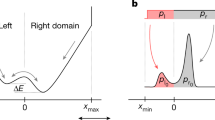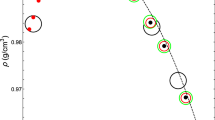Abstract
IN a recent letter to NATURE (Feb. 16, p. 244) I directed attention to Beilby's observation that water drops become hard when chilled to -12°C., and to the fact that water is quite fluid at -9.3° (White and Twining, Jour. Am. Chem. Soc., 50, pp. 380-389; 1913). That an important change in properties takes place between these temperatures is indicated by the difficulty all experimenters have had in cooling water below -10°. It may be that here the steady expansion which water undergoes below 4° ceases, and that with further lowering of temperature the contraction obtains which was predicted by Bridgman (Proc. Am. Acad., 47, p. 543; 1911–12). Water has been cooled in capillary tubes to -18.5° (T. Borovik-Romanova, rev. in Chem. Abs. Am. chem. Soc., 19, p. 3186; 1925), and as fine drops suspended in oil to -20° (M. L. Dufour, Arch. Sci. Geneva, 10, p. 350; 1861), but no information is given as to the physical state at these temperatures.
This is a preview of subscription content, access via your institution
Access options
Subscribe to this journal
Receive 51 print issues and online access
$199.00 per year
only $3.90 per issue
Buy this article
- Purchase on Springer Link
- Instant access to full article PDF
Prices may be subject to local taxes which are calculated during checkout
Similar content being viewed by others
Author information
Authors and Affiliations
Rights and permissions
About this article
Cite this article
HAWKES, L. Super-cooled Water. Nature 124, 225–226 (1929). https://doi.org/10.1038/124225b0
Issue Date:
DOI: https://doi.org/10.1038/124225b0
Comments
By submitting a comment you agree to abide by our Terms and Community Guidelines. If you find something abusive or that does not comply with our terms or guidelines please flag it as inappropriate.



